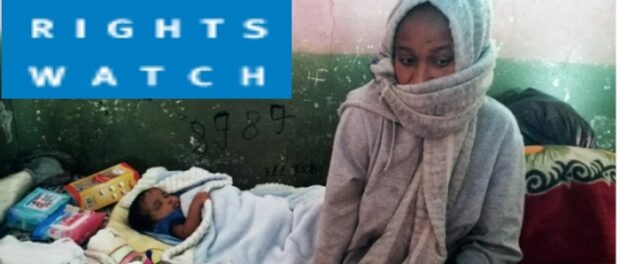Ethiopia: Unlawful Shelling of Tigray Urban Areas

Nairobi, February 12, 2021 (Haatufonline– Ethiopian federal forces carried out apparently indiscriminate shelling of urban areas in the Tigray region in November 2020 in violation of the laws of war, Human Rights Watch said today. Artillery attacks at the start of the armed conflict struck homes, hospitals, schools, and markets in the city of Mekelle, and the towns of Humera and Shire, killing at least 83 civilians, including children, and wounding over 300.
“At the war’s start, Ethiopian federal forces fired artillery into Tigray’s urban areas in an apparently indiscriminate manner that was bound to cause civilian casualties and property damage,” said Laetitia Bader, Horn of Africa director at Human Rights Watch. “These attacks have shattered civilian lives in Tigray and displaced thousands of people, underscoring the urgency for ending unlawful attacks and holding those responsible to account.”
On November 4, the Ethiopian military began operations in Tigray in response to what Prime Minister Abiy Ahmed described as attacks on federal forces and bases by forces affiliated with the region’s ruling Tigray People’s Liberation Front (TPLF). As of February 2021, many Tigray residents lack adequate access to food, fuel, water, and medicines. More than 200,000 people are internally displaced, while tens of thousands have also fled to neighboring Sudan.
Human Rights Watch interviewed 37 witnesses and victims of government attacks on Humera, Shire, and Mekelle, as well as 9 journalists, aid workers, and human rights and forensic experts. Interviews were conducted in person in Sudan and by phone between December 2020 and January 2021. Human Rights Watch also examined satellite imagery, and reviewed photographs and videos from the site of six attacks that corroborated witness accounts.
Human Rights Watch provided a summary of its preliminary findings to the Ethiopian government but received no response. In a parliamentary address on November 30, Prime Minister Abiy maintained that Ethiopian federal forces had not caused civilian casualties during their military operations in Tigray that month. A government Twitter account created during the conflict claimed that federal forces had “avoided combat in cities and towns of the Tigray region.”
Witnesses described to Human Rights Watch a pattern of artillery attacks by Ethiopian federal forces before they captured Humera, Shire, and Mekelle in November. In each of these attacks the Tigrayan special forces appeared to have withdrawn, while in Humera local militias lacked a significant presence to defend the town. Many of the artillery attacks did not appear aimed at specific military targets but struck generalized populated areas. Human Rights Watch found similar patterns in interviews with 13 people from the towns of Rawyan and Axum.
These attacks caused civilian deaths and injuries; damaged homes, businesses, and infrastructure; struck near schools; disrupted medical services; and prompted thousands of civilians to flee.
In the western border town of Humera, residents said that on November 9, artillery fired from Eritrea terrified unsuspecting civilians, striking them in their homes and as they fled. The shelling damaged residential areas in the Kebele 02 neighborhood, and struck near a church and a school, near a mosque in Kebele 01, and hit areas near the town’s main hospital.
A man was transporting the wounded on his motorbike when he noticed that a shell had torn through the roof of a house made of steel sheets about 100 meters away from Saint Gabriel church: “Five people were dead. We only found a 7-month-old infant crying among them. He was barely alive, so we took him to the church.”
Doctors from the town’s main Kahsay Aberra’s hospital said they were overwhelmed by the sudden influx of dead bodies and patients with severe injuries. One estimated that the shelling on November 9 killed at least 46 people and wounded over 200.
In the northwestern town of Shire, shelling began on November 17 and hit buildings in the center of town and an industrial area. Civilians were killed and injured as they fled near the Abuna Aregawi church. Later that day, witnesses saw Ethiopian forces pass through Shire alongside Eritrean forces.
Residents from the regional capital, Mekelle, said that heavy shelling on November 28 killed 27 civilians, including children, and wounded over 100. In one attack, shells struck a residential compound near a market, mosque, and an empty school in Ayder sub-city, and killed four members of a single family, including two young children, and wounded five adults and a 9-year-old child.
The laws of war applicable to the armed conflict in Tigray prohibit attacks targeting civilians or civilian structures, indiscriminate attacks, and attacks expected to cause greater harm to civilians than the anticipated military gain. Indiscriminate attacks include those not directed at a specific military target and that use means of attack that cannot be directed at a specific military target. Bombardments that treat distinct military targets in a city or town as a single military objective would also constitute an indiscriminate attack. Individuals who commit serious violations of the laws of war deliberately or recklessly are responsible for war crimes.
All forces have an obligation to minimize harm to civilians. They are required to take all feasible precautions to ensure that attacks are directed at military targets, and not civilians. Though several residents in Humera and Mekelle said they saw the use of apparent spotters to direct mortar fire, Human Rights Watch could not determine whether spotters were systematically used or effective, as shells repeatedly struck populated areas that contained no evident military targets.
As fighting in Tigray continues, all parties to the conflict should abide by the laws of war. Ethiopian federal forces should cease indiscriminate attacks, investigate alleged laws-of-war violations, and refrain from using explosive weapons with wide-area effects in populated areas. All sides should allow unhindered access by humanitarian agencies and ensure that health facilities can adequately function. Access to essential services and communications should also be restored.
The United Nations high commissioner for human rights should send a fact-finding team into the region to investigate alleged violations of the laws of war in Tigray, and to ensure that evidence of abuses is preserved, Human Rights Watch said.
“As the civilian toll of the Tigray conflict comes to light, it is clear that a thorough inquiry into alleged laws-of-war violations in the region that pave the way for justice is desperately needed,” Bader said. “The Ethiopian government should promptly allow UN investigators into Tigray to document the conduct by warring parties in a conflict that has devastated the lives of millions and should no longer be ignored.”
Tigray Conflict
The Tigray People’s Liberation Front (TPLF) dominated Ethiopian politics for almost three decades as part of a ruling coalition that was responsible for serious human rights violations, before Abiy became prime minister in April 2018. Tensions between the federal government and the Tigray regional authorities increased after the federal government reconfigured the ruling coalition into a single party in 2019, and postponed highly anticipated national elections citing Covid-19 related health risks in March 2020. Several opposition parties denounced the federal government’s decision to delay elections, including the TPLF, which held a regional election in Tigray in September in defiance of the federal government’s decision.

Leave a comment